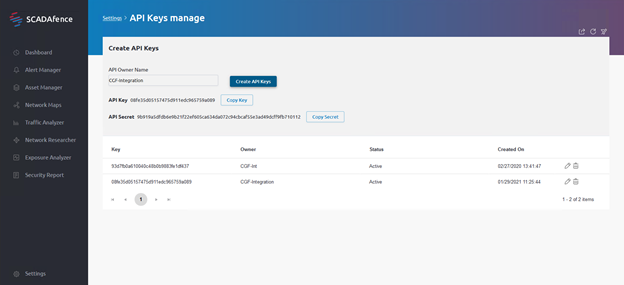import requests
import json
import time
import urllib3
urllib3.disable_warnings(urllib3.exceptions.InsecureRequestWarning)
# Set your own parameters here:
SCADAfenceIP="IP" #<SCADAfence Instance IP
SECRET = "12345678ABCDEF12345678ABCDEF12345678ABCDEF12345678ABCDEF" #<SCADAfence API Secret key
KEY="08fe08fe08fe08fe08fe" #SCADAfence API Key
# Global setup
SEVERITY_LEVEL = {
'Information': 1,
'Warning': 2,
'Threat': 3,
'Severe': 4,
'Critical': 5
}
SEARCH_IPS=[
{
'IP': "192.168.0.222",
'alerts': 0,
'blocked': 0
}
]
PARAMS = {'status': "Created"} # if you open the alerts, the status will move to: InProgress. if you resolve them: "Resolved"
HEADERS = {"x-api-key": KEY, "x-api-secret": SECRET, "Accept": "application/json"}
SCADAFENCE_URL = "https://"+SCADAfenceIP+"/externalApi/alerts"
#Barracuda Networks API Call
BARRACUDA_IP="IP:8443"
BARRACUDA_KEY="twCEEtwCEEtwCEEtwCEEtwCEE"
BARRACUDA_HEADERS_GET = {"X-API-Token": BARRACUDA_KEY, "Content-Type": "application/json"}
BARRACUDA_HEADERS_POST = {"X-API-Token": BARRACUDA_KEY, "Content-Type": "application/json", "accept": "*/*"}
BARRACUDA_PARAMS_POST = {"envelope": "true"}
def block_IP(bl_ip, blocked): # Change as needed for Barracuda
hostName = 'SCADAfence_Malicious_User' + str(blocked)
BARRACUDA_HOST_POST_URL = "https://" + BARRACUDA_IP + "/rest/config/v1/forwarding-firewall/objects/networks"
BARRACUDA_HOST_POST = {"name": hostName, "included": [{"entry": {"ip": bl_ip}}]}
BARRACUDA_RULE_POST_URL = "https://" + BARRACUDA_IP + "/rest/config/v1/forwarding-firewall/rules"
BARRACUDA_RULE_POST = {
"name": "BLOCK-SCADAfence-Malicious-Host",
"source": {
"references": hostName,
},
"destination": {
"references": "Any"
},
"service": {
"references": "Any"
},
"action": {
"type": "block"
},
"position": {
"placement": "top"
}
}
res_post = requests.request("POST",
BARRACUDA_HOST_POST_URL,
verify=False,
params=BARRACUDA_PARAMS_POST,
json=BARRACUDA_HOST_POST,
headers=BARRACUDA_HEADERS_POST
)
print ("res_post = " , res_post.url)
print (res_post.text)
time.sleep(2)
res_post = requests.request("POST",
BARRACUDA_RULE_POST_URL,
verify=False,
params=BARRACUDA_PARAMS_POST,
json=BARRACUDA_RULE_POST,
headers=BARRACUDA_HEADERS_POST
)
print ("res_post = " , res_post.url)
print (res_post.text)
####SCADAFence
#Scadafence API Configuration
def trigger_intergration_alert(ip_addr, alert_name):
HEADERS = {"x-api-key": KEY, "x-api-secret": SECRET, "Accept": "application/json"}
SCADAFENCE_URL = "https://"+SCADAfenceIP+"/externalApi/alerts"
SCADAFENCE_URL_POST="https://"+SCADAfenceIP+"/externalApi/alert"
DATA_POST = {'severity': 'Critical', 'ip': ip_addr, 'description': 'Incident Detected - Informing Barracuda', 'explanation' : 'System detected suspicious activity: ' + alert_name, 'remediation' : 'Check the affected device for unauthorized activities.', 'details': alert_name ,"active" : True}
PARAMS_POST = {}
res_post = requests.request("POST",
SCADAFENCE_URL_POST,
verify=False,
params=PARAMS_POST,
data=DATA_POST,
headers=HEADERS
)
print ("res_post = " , res_post)
def dot_sleep(ttime, tinterval):
for t in range(1,ttime):
print('.', end='', flush=True)
time.sleep(tinterval)
print ('')
def main():
# ---- first checking about alerts in SCADAfence
try:
print ('Looking for trouble...', end='')
# dot_sleep (20,0.3)
alerts=0 #a counter of alerts. not used in this scenario, can be used for aggregation of alerts.
blocked=0 # counter of blocked devices. also serves as unique suffix for barracuda object names
new_src_alert=0
plc_stop_alert=0
while blocked < 2: # will only handle blocking 2 devices. In production logic can be different.
res = requests.request("GET",
SCADAFENCE_URL,
verify=False,
params=PARAMS,
headers=HEADERS
)
if not res.text:
print ("ERROR: API returned empty")
return None
x = json.loads(res.text)
for val in x:
IP = val["ip"]
# print ("VAL:", val)
if val["type"] == "New Source IP Connecting to industrial device" and new_src_alert == 0:
print ("--- Found <" + val["type"] + "> with severity <" + val["severity"] + "> for " + IP)
print ("!!! " + IP + " performs suspicious activity that looks like an on-going security incident.")
new_src_alert = 1
alerts = alerts + 1
trigger_intergration_alert(IP, val["type"])
print ("!!! Blocking firewall access for: [" + IP + "]")
blocked = blocked + 1
block_IP (IP, blocked) #Call Barracuda Block Action
time.sleep(1)
if val["type"] == "PLC stop command issued" and plc_stop_alert == 0:
print ("--- Found <" + val["type"] + "> with severity <" + val["severity"] + "> for " + IP)
print ("!!! " + IP + " performs suspicious activity that looks like an on-going security incident.")
plc_stop_alert = 1
alerts = alerts + 1
trigger_intergration_alert(IP, val["type"])
print ("!!! Blocking firewall access for: [" + IP + "]")
blocked = blocked + 1
block_IP (IP, blocked) #Call Barracuda Block Action
time.sleep(1)
if blocked==0:
print ("No new threat found...")
time.sleep(5)
except (Exception, e):
raise e
if __name__ == '__main__':
main()

